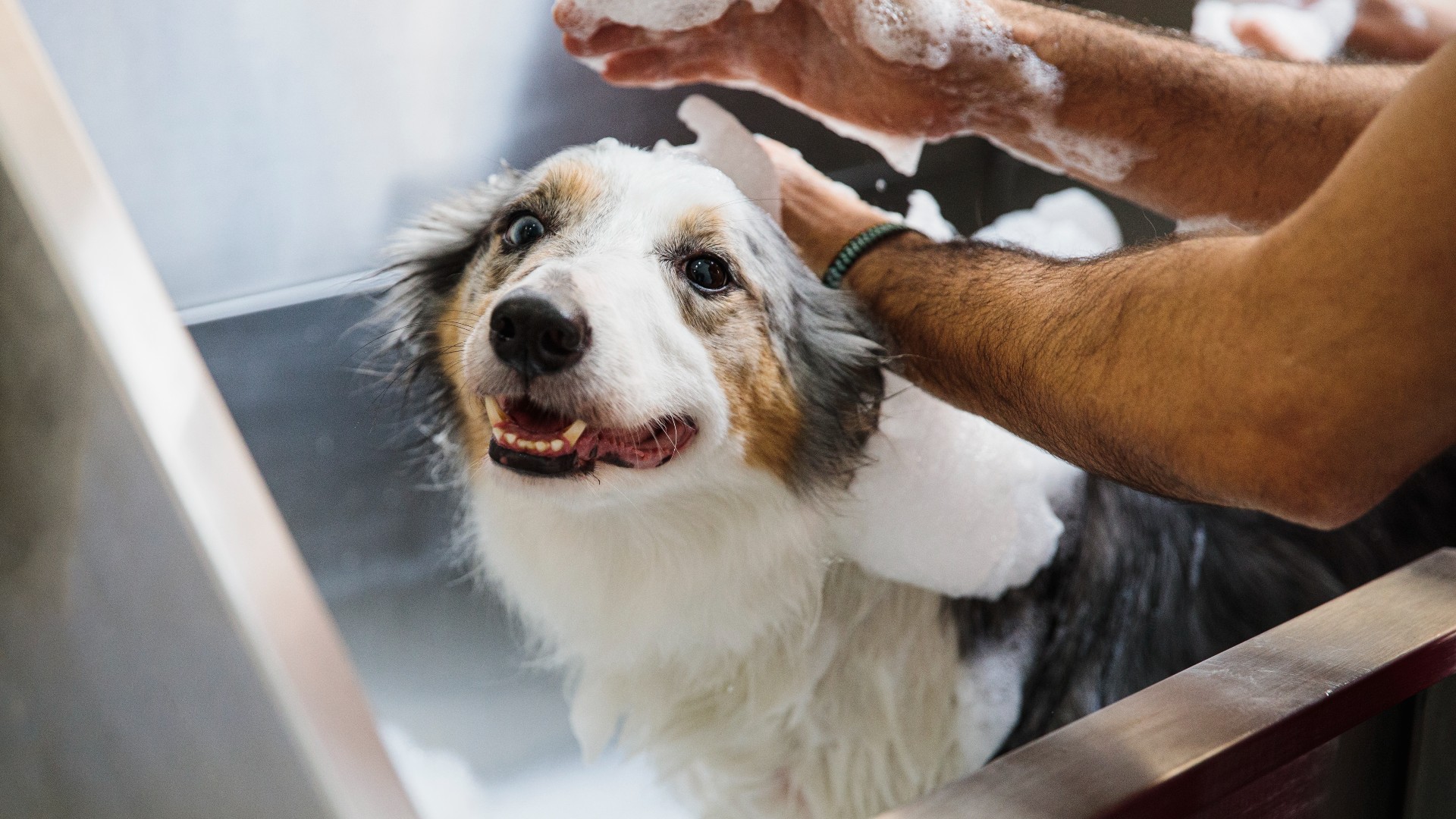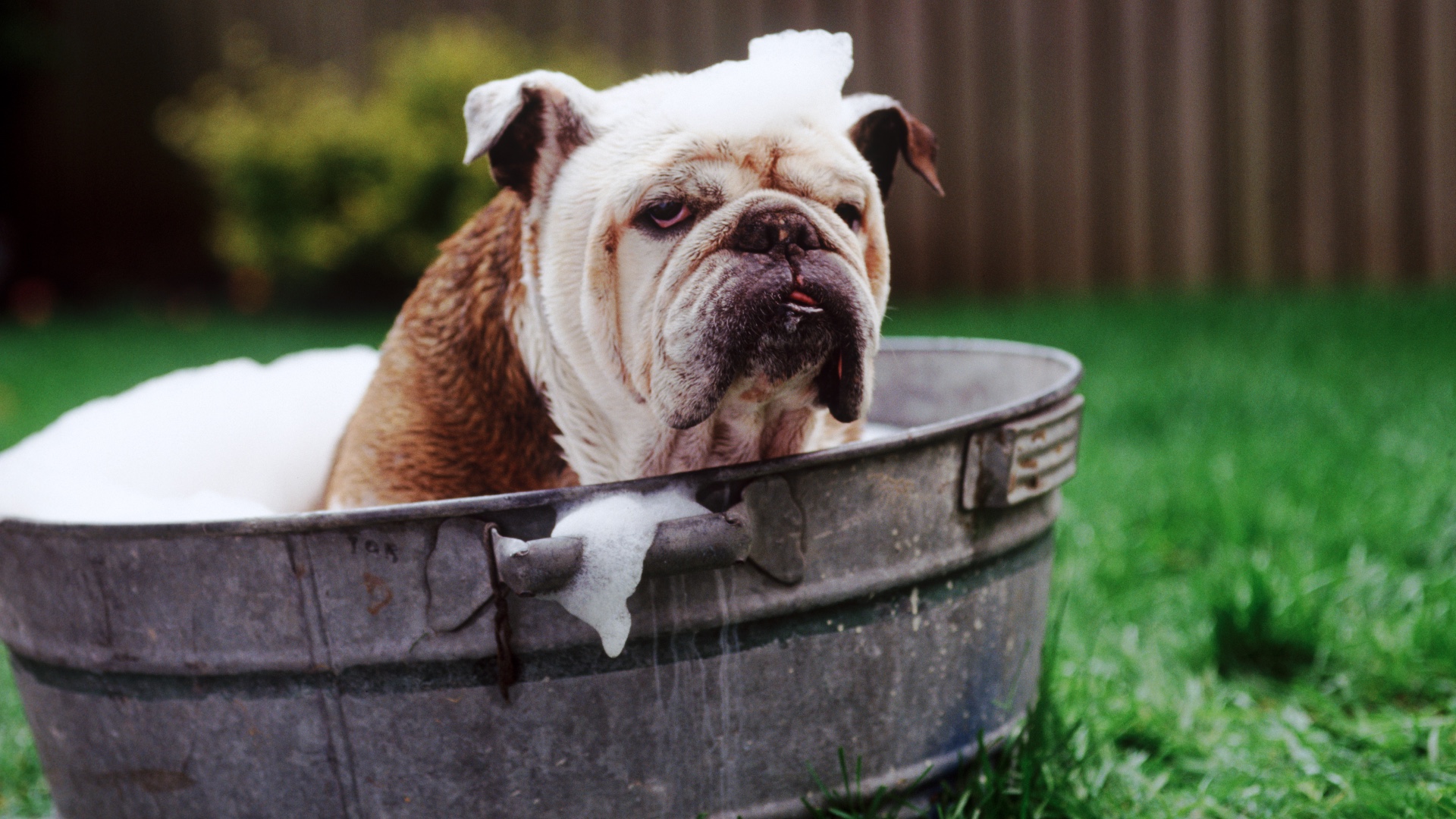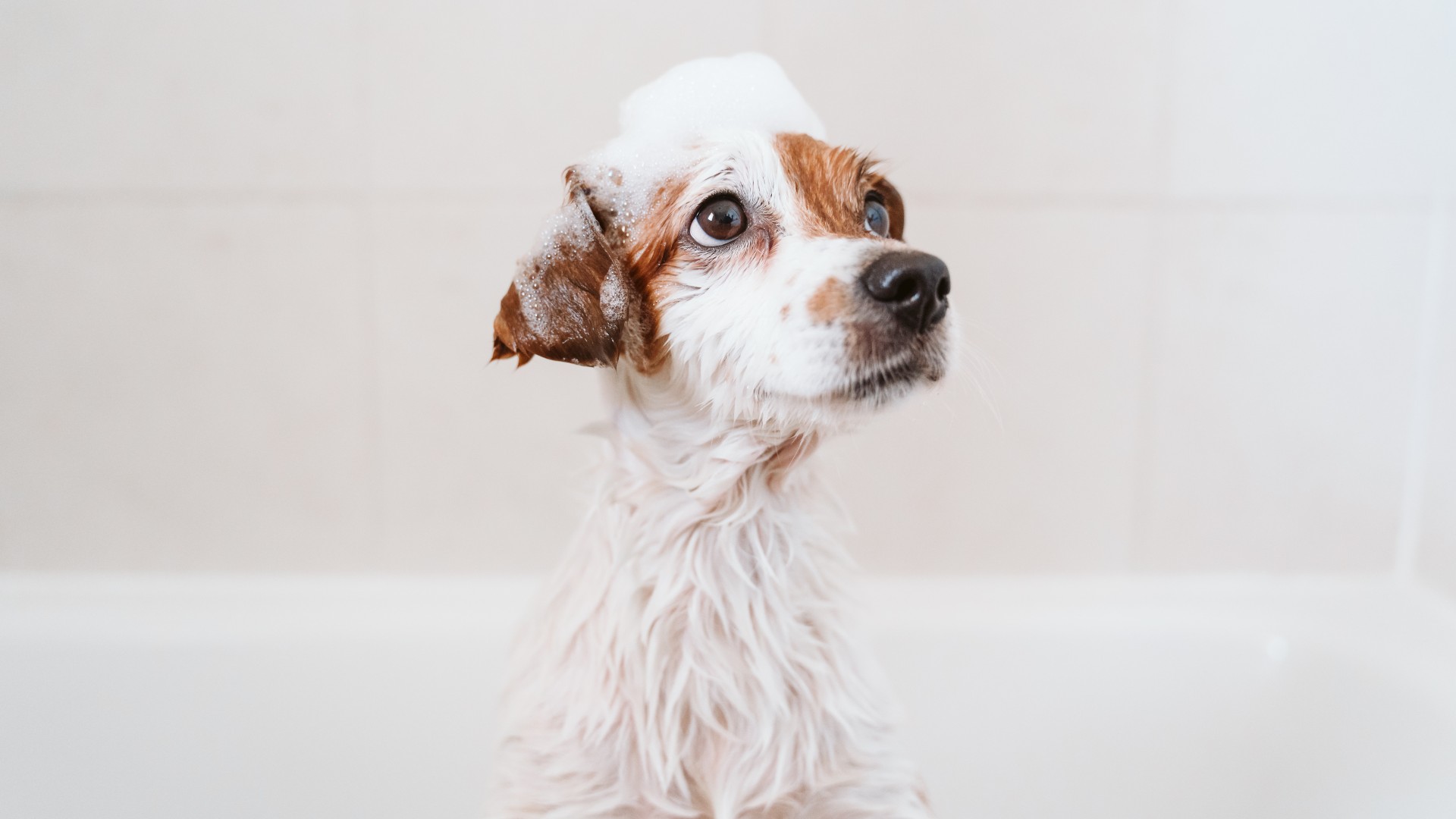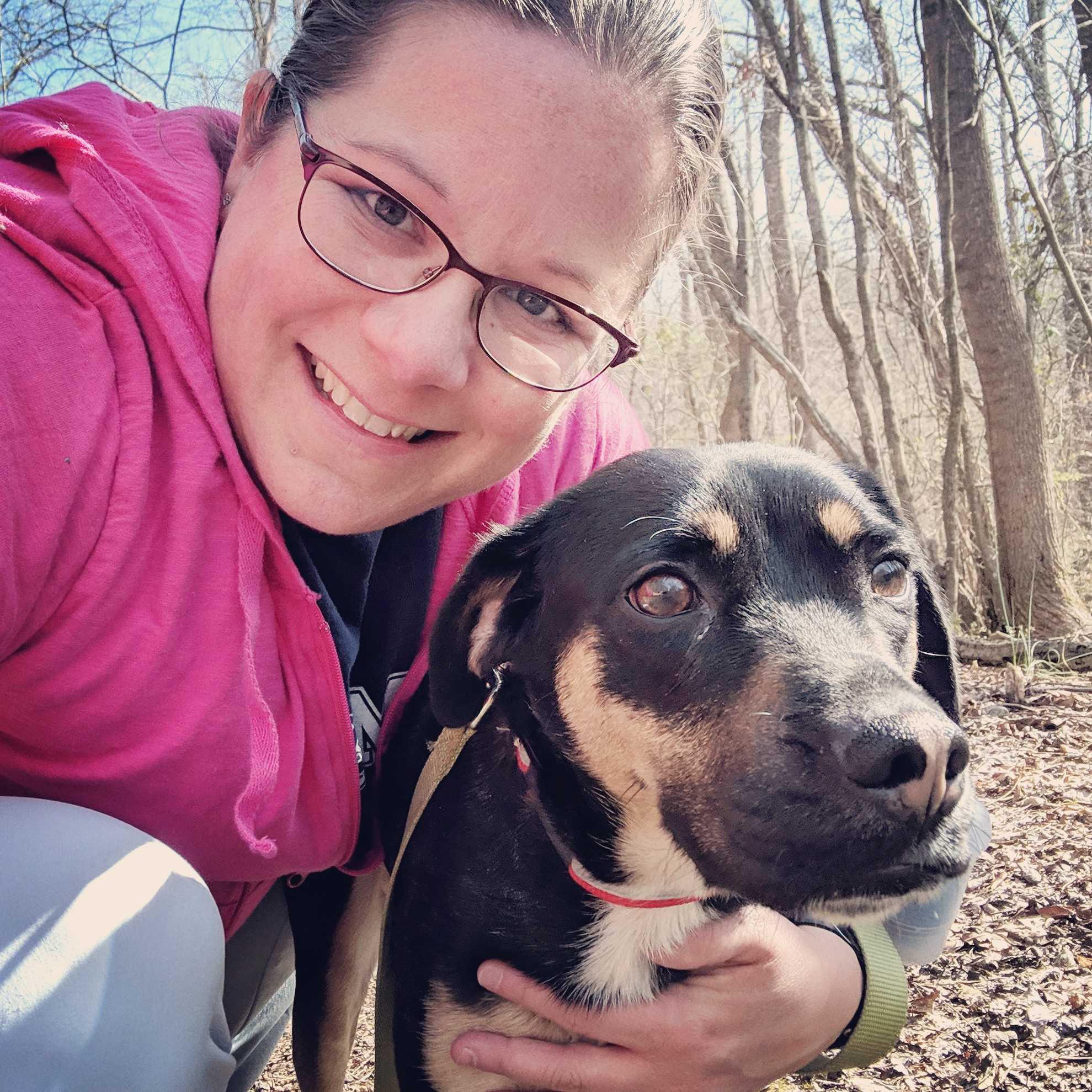Can you use baby shampoo for dogs? A vet answers
Can you use baby shampoo for dogs as part of their regular grooming routine? We find out…

Get the best advice, tips and top tech for your beloved Pets
You are now subscribed
Your newsletter sign-up was successful
Can you use baby shampoo for dogs? It’s a question you may have found yourself asking if your canine companion has come in all muddy after a walk and all you have to hand to get them clean is baby shampoo. While not ideal, a one-off bath with baby shampoo is unlikely to do your dog any harm.
Bath time has the potential to be a wonderful experience or an awful one for you and your pup depending on your dog’s preferences, how you wash them and whether what you use soothes or exacerbates any skin issues they have. That’s why we always recommend you learn how to give a dog a bath and take some time to understand what products are suitable for your dog’s unique skin and coat needs.
If you don’t have any of the best dog shampoo to hand and your pup doesn’t have a skin condition, then resorting to baby shampoo in a muddy emergency is perfectly safe. But it’s important that you don’t use human shampoo to wash your dog on a regular basis as these formulas are too harsh for your pup and will strip away the natural oils their skin needs to stay healthy.
Below, Dr. Catherine Barnette goes into more detail around why vets don’t recommend human-grade shampoos for use on dogs, signs you’re using the wrong shampoo for your pup’s skin and coat needs, and her favorite tips for bathing your dog.

Dr. Barnette graduated from the University of Florida in 2006 where she received both her B.S. in Zoology and her Doctor of Veterinary Medicine (DVM). She has 15 years of clinical experience as a small animal veterinarian, treating dogs, cats, and occasional exotic patients. When she’s not writing content as a freelance veterinary writer, Dr. Barnette lives in southwest Florida with her husband and daughter (plus two cats, a dog, and a rescued dove!) and enjoys kayaking, biking, and hiking.
Is human shampoo safe for dogs?
While the shampoo that you use to wash your hair with might seem like a gentle and appealing option for your dog, human shampoo can actually be damaging to their coat and skin if used regularly. There are several critical differences between dog skin and human skin; these differences mean that the two species require different types of shampoo for the best results.
Human skin and canine skin differ significantly in pH (acidity). Sources vary, but human skin is acidic, with a pH of 4 to 6.0. Dogs, in contrast, have more alkaline (or basic) skin than this. Human shampoos are pH-balanced to work well on our acidic skin, while canine shampoos are pH-balanced for alkaline skin. Therefore, using human shampoo on your dog could negatively impact the pH of your dog's skin, leading to problems.
Dogs also have small amounts of natural oils in their coat, which keep their fur shiny and protect against potentially harmful bacteria and other microbes. Most human shampoos will strip these oils from your dog's coat. Human shampoos are designed to remove the large amounts of grease from our hair, so this will have quite a drying effect on your dog’s skin and coat.
Get the best advice, tips and top tech for your beloved Pets
Human shampoos also tend to be quite heavily perfumed, which could irritate your pet’s skin and overwhelm their sensitive sense of smell.
Is baby shampoo safe for dogs?
Baby shampoos are often considered to be gentler than other human shampoos because they contain fewer ingredients and minimal perfumes. However, they are still intended for human skin, so they have an acidic pH.
Therefore, even baby shampoo can be harsher than high-quality dog shampoo on a dog's skin. On the other hand, baby shampoo should be safe for one-off use in an emergency, but avoid using it repeatedly.
Safe dog shampoo alternatives

Sometimes, you may really need to bathe your dog, but you don't have any dog shampoo to hand. So, what safe alternatives are there?
1. Baby shampoo
In an emergency, baby shampoo is unlikely to cause immediate pain or skin trauma for your dog. For example, if your dog rolls in something disgusting in your backyard and you don’t have any dog shampoo available, a single bath in baby shampoo is unlikely to do any damage.
You shouldn’t make a habit out of it, though, so it would be best to stock up on some dog-specific alternatives for next time.
2. Chemical-free human shampoo
But what about if you don’t have dog shampoo or baby shampoo to hand? Other human shampoos are also fine for a one-off use, but try to choose one with as few chemicals as possible.
You should also avoid strong fragrances, which are often too strong for your dog's powerful nose. And remember to get some dog-specific shampoo as soon as possible so that you don't dry your dog's skin or cause other negative effects.
3. Dish soap
Another option for a one-off dog shampoo alternative is dish soap. The pH of dish soap is a lot higher than shampoos and soaps designed for human skin. This means that dish soap is much closer to the pH of dog skin and can make a good emergency substitute for dog shampoo.
Don't use it too regularly, though – it's harsh and contains no conditioners, meaning it'll strip your dog's skin oils, leaving them itchy or sore. Try to choose a dish soap with as few fragrances and added chemicals as possible.
The 'original' version is likely to be better for your dog's skin than the one with added foaming degreasing power or rinse aid! After all, you're washing your dog, not your dirty pots and pans!
Will baby shampoo kill fleas on dogs?
Any shampoo, including baby shampoo, can reduce flea numbers on your dog. Creating a lather and allowing it to sit on your dog for several minutes can effectively drown or suffocate fleas. When you rinse your dog, these dead fleas will also wash off.
While this may seem like a good idea, it is not a very effective method for dealing with a flea problem. As soon as your dog returns to your home or yard, new fleas will jump onto them. Sadly, it takes more than a bath to break the flea life cycle! Bathing your dog does not provide any residual benefits. Instead, talk to your veterinarian about a prescription flea preventative for your dog.
These treatments, which are often given year-round, will treat your dog’s current flea infestation while also preventing reinfestation. There are several flea preventatives available. Your veterinarian can help you choose the best one for your dog depending on your budget, their lifestyle, and whether you find tablets or spot-on treatments easier to give. You can also check out our guide to the best flea treatment for dogs where we outline the most reputable products currently available.
Choosing the best shampoo for your dog
Choosing the best shampoo for your dog
When bathing your dog, the most important thing is to use a shampoo that has been specifically developed for dogs. Suppose your dog has a specific skin condition, like allergies or seborrheic dermatitis.
In that case, your veterinarian may recommend a prescription shampoo that is specifically formulated to treat or prevent that skin disease. However, for most healthy dogs, any over-the-counter dog shampoo can be a good option for routine bathing.
Dog bathing tips

1. Avoid bathing too frequently
How often should I bathe my dog is a common question amongst pet parents and the good news is, you don't need to wash your dog anywhere near as often as you wash yourself!
Your dog’s skin produces far less oil than human skin, so they only need to be bathed when they become smelly or dirty. Monthly bathing is a good starting point for most dogs, although you may find that your dog needs to be bathed more or less often, depending on their coat type and lifestyle.
Unless specifically instructed by your veterinarian, do not bathe your dog more frequently than once every other week.
2. Make bathtime an enjoyable experience
You will be bathing your dog approximately once a month for the remainder of your dog’s life, so it’s best to make bath time as enjoyable as possible for them. Give your pup a few of the best dog treats during bath time to help them develop a positive mental association with it.
If you bathe your dog in a sink or bathtub, consider smearing some peanut butter along the edges. (Avoid sugar-free peanut butter because it may contain xylitol, which is toxic to dogs.) Many dogs love the taste of peanut butter, so they’ll often stand still while licking it off the sides of the bath!
Keep water out of your dog’s ears and eyes during baths, and make sure the water is not too deep. Remember that they could easily slip or try to jump out, and any negative experiences could make them more fearful next time, so keep a close eye.
3. Rinse your dog thoroughly
You should always rinse your dog thoroughly after bathing. Even a high-quality dog shampoo can irritate the skin if it is not rinsed out. Therefore, it's essential to take the time to thoroughly remove all shampoo residue from the skin. Take care not to get too much water in your dog's ears, though. They won't enjoy this, and it will make their ear canals moist, predisposing them to ear infections.
What are the signs I am using the wrong shampoo for my dog?
With so many dog shampoos on the market, it can be hard to choose. There's not one shampoo that suits every pet, so it’s important to keep an eye on your pooch after bathing them to make sure no problems arise. If you are using the wrong type of shampoo for your dog, then you might see some of the following signs:
- Skin becoming pink or red
- Increased itchiness (rubbing at the face, licking paws, or scratching their body)
- Skin becomes flaky or crusty
- Bald patches appear
- Rashes or spots
Speak to your vet if your dog has had an adverse reaction to his shampoo, or the dog-shampoo alternative that you have used.
Although the answer to the question "can you use baby shampoo on dogs?" is technically yes, it's best to avoid doing so. Human shampoo lacks a dog-appropriate pH, and it's often too harsh for a dog's skin, containing more chemicals and perfumes. Talk to your veterinarian about the best shampoo for your dog to keep their skin and coat as healthy as possible.
For more great canine content, check out our guide to this simple grooming mistake can pose a serious health risk for your dog for an important tip for what to include in your dog's grooming routine.
Dr. Barnette is a graduate of the University of Florida, where she received both her B.S. in Zoology and her Doctor of Veterinary Medicine (DVM). She has 15 years of clinical experience as a small animal veterinarian, treating dogs, cats, and occasional exotic patients. She now works as a freelance veterinary writer, creating educational content for veterinarians, veterinary team members, and dedicated pet owners. Dr. Barnette lives in southwest Florida with her husband and daughter (plus two cats, a dog, and a rescued dove!) and enjoys kayaking, biking, and hiking. Learn more about Dr. Barnette at www.linkedin.com/in/catherinebarnette.

